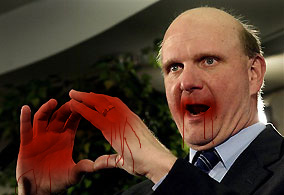UnNews:Management by Assholism sweeps the workplace
19 January 2007
RICE UNIVERSITY, Houston, Thursday — American workplaces are being revolutionised by the latest trend in management skills: the new technique of Management by Assholism, as propounded in the new book of the same name by famed management guru Tom Peters.
The movement originates with research by Jing Zhou and Jennifer George at Rice University, who showed that discontented employees spot potential pitfalls and solutions in business sooner if properly encouraged. The secret, they say, is "encouraging the expression of voice."
"Of course," says Peters, "these ivory-tower research scientologists can't be expected to understand the day-to-day realities of man management in the working environment. So professional, experienced managers who really know the science and art of running a business unit need to take their pie-in-the-sky fancies and pick out the useful bits as inspiration to further our work and goals on a practical level."
In Management by Assholism, workers are stimulated to creativity by careful and measured changes to the working environment. Starting times are changed apparently unpredictably. The thermostat is adjusted at random to get workers out of their "comfort zones" and increase their thinking presence in their work. Instructions are properly adjusted between giving them and assessing how well they have been followed. Managers must be vague about future plans, using a standard set of ambiguous phrasings, particularly with regards to compensation and benefits, changing things on a schedule detailed in the charts in the book. Human Resources and Payroll can also be leveraged toward these goals with fantastic efficacy.
It is important not to discriminate in the provision of discontent stimulus. "Equal opportunity laws are very clear on this: we must provide an equally stimulating environment for all employees of a given level. It would be wrong to do otherwise." Upsetting workers' equilibrium must not be done abusively or with favoritism, but strictly according to mandated procedure. Process is important.
Creatively stimulated workers who see a problem are encouraged to provide their suggestions in 100 characters or less on a written and notarised Problem Report Form. "Suggesting a solution is not encouraged, of course — solving the problems should be dealt with by their superiors who are charged with such things." A copy of each complaint is also sent to Human Resources to be placed on the employee's permanent personnel file.
"Management by Assholism really fits in with how managers know how to work," said Peters. "It leverages our core competencies as managers in a synergistic fashion. With some thinking outside the box. And quality. And stuff."
Entrepreneurs such as Donald Trump and Sir Alan Sugar expressed their strong support for the movement. "We've used these techniques with fabulous success for years. Sometimes, you've just got to fucking tell them."
Dr Zhou was somewhat disconcerted at the response to her work. "I said that listening to your good but discontented workers was important because they supply the good ideas that move things forward. I specifically said that just making the workplace horrible wouldn't work and wouldn't get things done!"
Dr Zhou was taken aside by her boss, advised to be a better team player, that in academic politics a researcher needs to go along to get along, that "you catch more flies with honey than vinegar, you know," and to run along and be a good girl.
Sources[edit | edit source]
- Jing Zhou and Jennifer George "Sabotage in the American Workplace by doing precisely what you're told" Rice University, January 18, 2007
